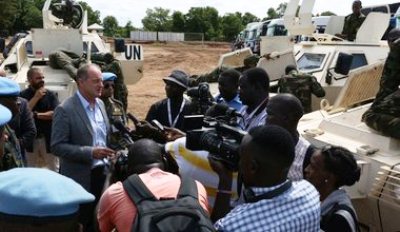South Sudan’s Kiir, UN envoy differ over regional forces
September 27, 2017 (JUBA) – South Sudan President Salva Kiir and the head of the United Nations Mission in the country (UNMISS) have each differed over the deployment of regional protection forces.

“There is no dispute. What happened when they [regional force] came has resolved. They wanted to deploy at the airport, but we said that if they have gone to the airport, we will leave them to stay there but we stop cooperation with them. There will be no force coming in and we are not going to give any clearance,” said Kiir.
He added, “At the end, they had to withdraw from there [airport]”.
The South Sudanese leader made the remarks while speaking at an event of high-ranking integrated police officers in the capital, Juba.
According to Kiir, the disputes which the government had with the world body following the deployment of the regional protection forces have been resolved after the latter accepted to re-deploy.
The United Nations Security Council (UNSC) issued Resolution 2304 in August last year, allowing deployment of more than 4,000 troops to beef up the existing 13,000 UN Mission in South Sudan (UNMISS) force.
South Sudan’s Transitional Government of National Unity [TGoNU] confirmed its unconditional consent to the deployment of the force in a communiqué to the UN Security Council on November 30, 2016.
Initially, it was agreed that once deployed, the regional protection forces, would to protect key installations like the airport, facilitate the delivery of humanitarian assistance as well as protects the civilians.
The regional forces are also expected to further strengthen the security of UN protection of civilians’ sites and other UN premises.
President Kiir, however, told security forces that their role was now to treat the peacekeeping force in the country with respect and show the best of the country after the dispute was eventually resolved.
“Now, your role as a security force is not to fight these forces, you are not to fight the RPF or forces of the UNMISS. You work to cooperate with them. They are foreigners and you must show them the best part of this country,” he said.
But while President Kiir clearly stated that the issue with regional forces had been resolved, the head of the UN mission told its General Assembly that matters remain unresolved until now.
“I must address briefly the deployment of the regional protection force. While the government has officially repeated its acceptance of the RPF and UNMISS has closely adhered to the Government’s clearances and protocols, the positioning of the RPF in relation to the Juba airport – including at the adjacent mission’s Tomping base remains a vexed issue,” David Shearer told the world body’s General Assembly.
He added, “The RPF mandate is clearly and unambiguously set out in resolutions passed by this Council”, he added.
The top UN official said he and the force are still engaging the government in discussion over unresolved issues and would consider reaching out to the regional leaders and the African Union (AU).
“Together with my force commander, I am engaging the government in discussions over unresolved issues and will reach out to IGAD [Intergovernmental Authority on Development] and the AU to have a meeting with the chiefs of defence staff from RPF troop contributors and the TGoNU in Juba as soon as possible”, said added.
South Sudan’s civil war broke out in December 2013 after President Salva Kiir accused his former deputy Riek Machar of plotting a coup.
A peace deal signed in August 2015 led to the formation of a coalition government but was again devastated by fresh violence that broke out in July last year.
Tens of thousands of South Sudanese have been killed, with millions of others displaced and over 4 million people left severely food insecure since December 2013.
(ST)
